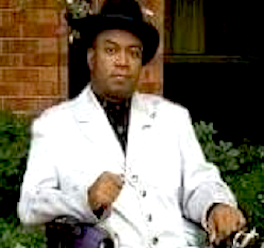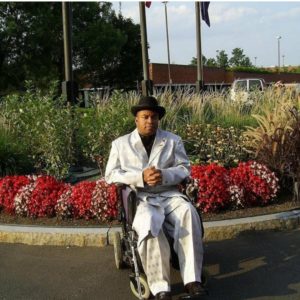
Timothy Elliot
Timothy is a disabled veteran who mentors individuals with disabilities and teaches them how to advocate for themselves. As a part of his advocacy, Timothy has been spreading the word about ABLE accounts, especially to people who cannot afford to set up a trust fund.

2020 ABLE NRC Ambassador Tim Elliott is a disabled veteran who mentors individuals with disabilities and teaches them how to advocate for themselves. Living in Brooklyn, New York, Tim has an ABLE account with the NY ABLE program. As part of Tim’s work as a Program Outreach Specialist for the Office of Home and Community Living with New York’s Office for People with Developmental Disabilities (OPWDD), and through his advocacy work, Tim has been spreading the word about ABLE accounts, especially to people who cannot afford to set up a trust fund.
In Tim’s own words:
Life Before Disability
My life as a disabled person didn’t start out like most individuals. I was a healthy 21-year-old in the beginning stage of my naval career. I was looking forward to making the military my career, going from a reservist to a full-time service member, successfully graduating from Aviation Electronic Technician School in Tennessee and moving on to Norfolk, Virginia and hoping to go out to the fleet to serve.
Life After Disability
I was only a year into my naval career before I became disabled, paralyzed from the shoulders down, by what the doctors determined to be either Transverse Myelitis or Spinal Meningitis. Whichever one, my life was changed forever. More than 30 years later, with some movement back, it’s still a struggle. Besides the physical and mental struggles of living with a disability, another obstacle is financial instability. The feeling of having to jump through hoops not only to qualify for disability benefits, but having to fight to keep the little that you get, just adds to your frustration. Although I’m lucky to have worked a part-time job for the past 19 years and a full- time job for the past six years, there is still the stress of keeping Medicaid benefits. Medicaid Buy-In solved the income limit concern, helping me to maintain Medicaid. Then the ABLE Act finally became an option that addressed Medicaid resource limits.
ABLE allows an individual to save up to $15,000 a year without losing their benefits. I’ve used mine to pay rent when I needed to use my main account for something else. I’ve also used it for travel and personal aide services. ABLE is a great tool for the disabled, but has a lot of room for growth. Getting more individuals to establish ABLE accounts is not just about educating and promoting the account. I suggest that the ABLE debit card companies could add incentive options for qualified disability purchases for ABLE account holders. Credit card companies get people to sign up for their cards by attaching incentives to them (reward points that can be exchanged for gift cards or cash, discounts at with certain merchants, exclusive perks with the banking institution affiliated with the card). These are tangible benefits a person can access more immediately than an investment option. Investment options are a great benefit of an ABLE account, but investing takes time to be of benefit to the account holder.
ABLE gives the disabled community an opportunity to begin to take control of their lives financially along with Medicaid Buy-In. For individuals that are working, ABLE deposits can only be made after taxes are taken from their paycheck. Some type of tax incentives would make ABLE more attractive to the disabled community. Asking for incentives like discounts or tax incentives may seem like we’re asking for special treatment, but when you have limited employment opportunities, limited income, limited housing options, limited transportation and less than quality food choices that are affordable, on top of worrying about maintaining working adaptive equipment and quality homecare, these incentives would be a hand up not a hand out.
The Americans with Disabilities Act (ADA) was a great first step for the disabled community, but it was only a first step. In order for the disabled community to have real lives like everyone else has the opportunity to live, we have to be allowed to play on the same field. We are tired of being spectators in the game of life. We need politicians to acknowledge our existence at all times, not just for election or re-election photo ops. Let’s expand the ADA for not only private organizations or local and state governments, but also the federal government. As a former employee of the federal government when I served my country, how can you ask me to serve when I’m able, but not grant me the same human rights once I can no longer serve?
